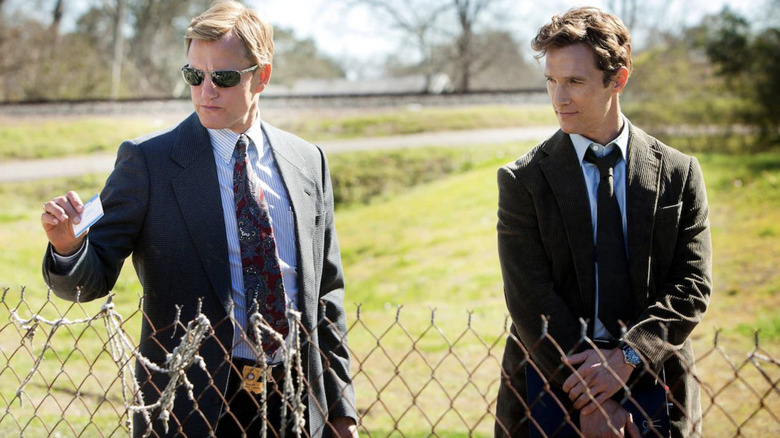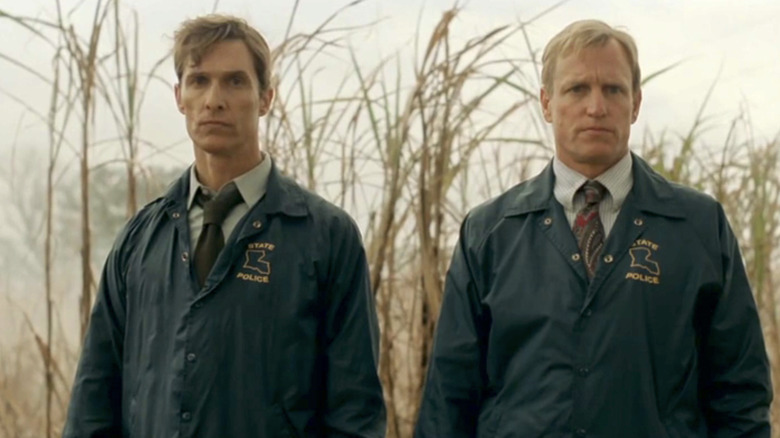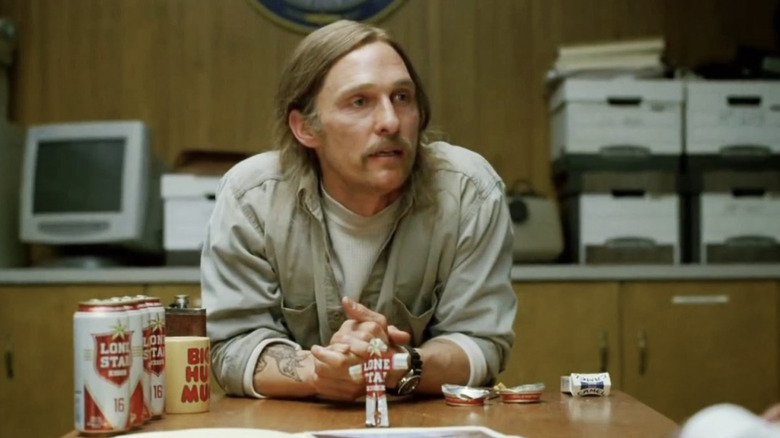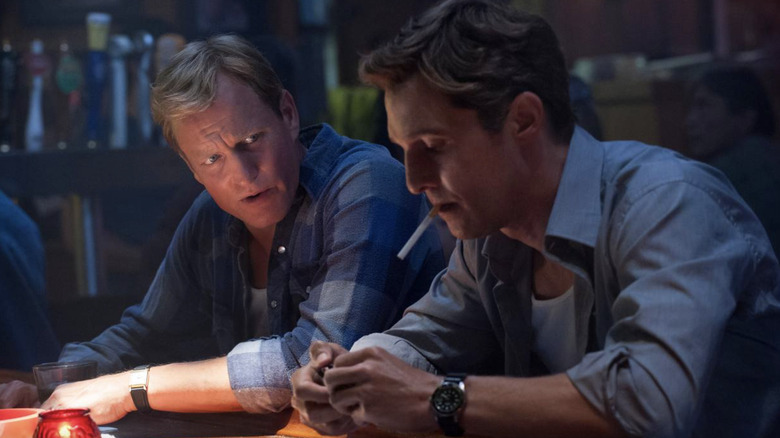Catching The Killer Was Never Really The Point Of True Detective
Directed by Cary Fukunaga and written by Nic Pizzolatto, "True Detective" season 1 could be considered the high point of the anthology series, which is in the middle of getting season 4 off the ground. The critically acclaimed first season led to a fast-tracked second season, which ultimately was met with a mixed reception. Season 3 of the show returned to what made a lot of the original season great, but it still didn't quite recapture the initial collaboration between Pizzolatto and Fukunaga, who had done the entirety of season 1 together. Seasons 2 and 3 featured a mix of different directors and writers, straying from the distinct sort of vision that two consistent creators would bring.
Pizzolatto and Fukunaga's approach to their first "True Detective" story helped to make it as successful as it was. Like most crime dramas, you would think that the point would be to solve the crime and catch the killer. However, in the philosophical and pessimistic world of "True Detective," capturing the killer was only a byproduct of the journey taken by detectives Cole and Hart.
The nature of an investigation
In a video from Behind the Curtain, Nic Pizzolatto discussed how the nature of a crime story opens up the setting of a story for all kinds of introspection, not needing to just focus on the crime and killer:
"The crime story both gives you a plot and a series of escalations and pressures that you can put onto your characters, but it also tends to offer a kind of cross-sectional view of the society in which the crime takes place. Because the nature of an investigation is that you will be exposed to all these facets of a place."
"True Detective" was more about how the characters grow than giving the audience an answer about who committed the grisly crimes. Pizzolatto saw the crime drama backdrop as a means to an end, that end being his interest in writing compelling characters:
"That was definitely one of the basic structural goals of the series, was to use the machinery of the procedural to get at what interests me, which is the dissection of character and motivation, and a world vision that can encompass those things and reflect them. Nobody was gonna let me make a TV series that was just about two men riding around talking, so I put murder in there."
Bait and switch
Pizzolatto's bait and switch of using audiences' fascination with serial killers to tell a compelling interpersonal story wasn't lost on the writer. In the same video, Pizzolatto speaks on how the format of a straightforward procedural would help make more room for philosophical discourse:
"Nobody was gonna let me make a TV series that was just about two men riding around talking, so I put murder in there ... The public's fascination with serial killers have almost turned them into comic book villains, and I wanted a killer whose story was not so complicated that unraveling it was going to take up all our time. The more simple and solid your plot is, the more free you are to explore ways of telling that haven't been tried yet, and to take discursive detours in conversation and scenes."
At the center of "True Detective" season 1 is the story of Hart and Cole and their dynamic. The decades-spanning story was compelling because of Matthew McConaughey and Woody Harrelson's performances, bringing Pizzolatto's thought-provoking dialogue to life. The fact that most of the show is structured around the two leads discussing their relationship with each other speaks to Fukunaga and Pizzolatto's dedication to their characters over the crime story.
How a relationship changes
Having "True Detective" season 1 open with flash-forwards showing the two leads in such vastly different places than they are when the original crime first takes place engrosses viewers in the mystery of not just the murder but of the relationship between the two characters. According to Pizzolatto, in an interview with The Guardian, that was the point:
"I wanted to look at the relationship between these men and how it changed. I wasn't interested in doing what everyone else was doing. The point wasn't to write another serial-killer show."
"True Detective" season 1 had more than one compelling mystery, with the criminal investigation itself coming second to the question of their relationship with each other. Rust and Cole's begrudging respect for each other turning into a deep distrust and later reconciliation is what makes season 1 of "True Detective" so interesting. Season 2 of "True Detective" featured a more complicated story, with multiple characters that were a part of interweaving storylines, taking away from the more intimate and intense relationship between two characters that season 1 used as its foundation.
The third season of the series returned to the roots of season 1, following a similar structure of revisiting an older case, with Mahershala Ali's character's crippling mental state driving the story forward. Overall, "True Detective" season 1 was never about the killer, but about how the two detectives at the center learned about themselves and each other while solving the case.



